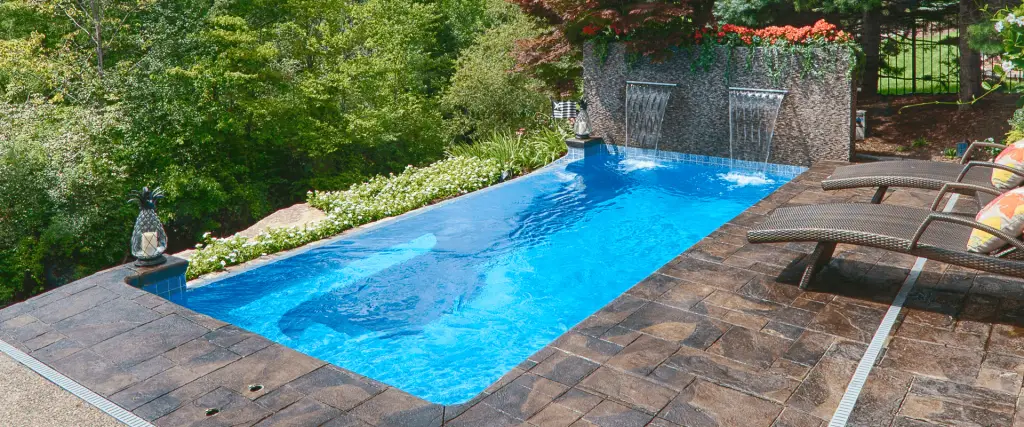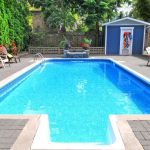A 12×24 inground pool typically costs around $25,000 to $35,000. Thinking about adding an inground pool to your backyard?
It’s an investment that can provide endless hours of summer fun and relaxation for your family and friends. Before diving in, it’s important to have a clear understanding of the costs involved. We will discuss the typical cost of a 12×24 inground pool.
This size is considered a popular choice, striking a balance between adequate space for swimming and fitting into most backyard spaces. We will explore the factors that influence the overall cost, such as the pool material, additional features, and installation expenses. By the end, you’ll have a better grasp of what to expect when budgeting for your dream backyard oasis.
Factors Affecting Cost
The cost of installing an inground pool can vary widely due to several factors. Understanding the primary elements impacting the overall expense will help you make informed decisions throughout the pool construction process. Below, we’ll examine these major contributors to a pool’s cost in detail.
Size Of The Pool
The size of the pool directly influences the cost of installation. A 12×24 inground pool, being larger, generally requires more materials and labor, resulting in a higher total cost. Additionally, factors such as excavation and equipment needed to accommodate a larger pool size can further contribute to expenses.
Material Selection
The choice of materials significantly impacts the cost of an inground pool. High-quality materials such as fiberglass or gunite are more expensive upfront but often have reduced maintenance costs in the long run. Conversely, vinyl liner pools typically have lower initial costs but may lead to higher overall expenses due to ongoing maintenance and eventual replacement costs.
Extras And Add-ons
Factors such as custom features, heating systems, pool covers, and lighting can substantially add to the overall cost of your inground pool project. These additional elements enhance the pool’s aesthetic appeal and functionality, but they come with an added price tag. It is essential to carefully consider the value these extras will bring to your enjoyment and long-term use of the pool when evaluating their cost impact.

Credit: azaleapoolsnc.com
Cost Breakdown
When planning to install a 12×24 inground pool, understanding the cost breakdown is crucial for budgeting and decision-making. This breakdown includes excavation and installation, pool equipment, decking and coping, as well as permits and fees. Let’s delve into each aspect.
Excavation And Installation
Excavation and installation costs typically account for a significant portion of the total expense. This includes the labor and equipment required to dig and install the pool. The cost can vary based on the complexity of the site and the type of soil. On average, this stage can cost between $5,000 to $10,000, depending on the specific factors involved.
Pool Equipment
Pool equipment encompasses essential components such as the filtration system, pumps, and cleaning tools. Budget about $2,000 to $5,000 for high-quality equipment, which is vital for maintaining water clarity and cleanliness.
Decking And Coping
Decking and coping contribute to the pool’s aesthetics and functionality. The cost largely depends on the materials chosen, such as concrete, pavers, or stone. Additionally, factors like size and complexity of the design can influence the cost. Prepare to allocate $5,000 to $10,000, taking into account material and labor expenses.
Permits And Fees
Obtaining permits and paying associated fees is an essential part of installing an inground pool. Budget approximately $1,500 to $3,000 for permits and potential inspection fees, which can vary based on your location.
Comparing Price Ranges
When considering the cost of a 12×24 inground pool, it’s essential to understand the different price ranges available in the market. Whether you are looking for a basic, mid-range, or luxury option, each comes with its own set of features and pricing structure.
Basic Inground Pool
A basic inground pool typically includes the essential elements for a functional swimming pool, such as basic concrete or fiberglass construction and minimal design features. Installing a basic pool can be a budget-friendly option for those looking for a simple backyard oasis.
Mid-range Inground Pool
The mid-range inground pool offers a step up in terms of design options and overall aesthetics. This type of pool often includes additional features like custom tiling, lighting, and landscaping elements to enhance the overall look and feel. These pools are a popular choice for homeowners seeking a balance between quality and affordability.
Luxury Inground Pool
For those looking to indulge in the ultimate backyard retreat, a luxury inground pool is the ideal choice. These pools are typically custom-designed to fit the homeowner’s specific preferences, featuring high-end materials, advanced technology, and luxurious amenities. While the cost of a luxury pool is higher, the investment can offer unparalleled style and comfort.
Hidden Costs To Be Aware Of
Landscaping
When installing a 12×24 inground pool, remember to budget for landscaping essentials such as plants, trees, and decorative elements.
Landscaping can enhance the aesthetics of your pool area, providing a visually appealing and welcoming outdoor space.
Fencing And Security
Protect your family and pets by installing a fence around your pool area to meet safety regulations and prevent accidents.
Consider security measures like alarms and pool covers to further enhance safety and peace of mind.
Maintenance And Repairs
Regular maintenance of your inground pool is crucial to ensure optimal functionality and longevity.
Be prepared for ongoing costs related to cleaning, water treatment, and potential repairs to keep your pool in top condition.
Diy Vs. Professional Installation
When it comes to installing a 12×24 inground pool, one of the most important decisions you need to make is whether to tackle the project yourself or hire a professional. Both options have their own set of pros and cons, which we will explore in more detail below.
Pros And Cons Of Diy
Going the do-it-yourself route can offer several advantages. First and foremost, it can save you a significant amount of money. By eliminating the cost of hiring a professional installation team, you can potentially cut down the overall expense of installing your pool. Additionally, undertaking this project yourself allows for a greater sense of accomplishment and the ability to tailor the pool installation process to your own preferences.
However, there are a few downsides to be aware of as well. DIY inground pool installation requires a high level of technical expertise and knowledge of various construction processes. If you are not confident in your abilities or lack experience in construction, you may encounter unexpected challenges that can delay the completion of your pool. Furthermore, any mistakes or errors made during the installation process may lead to costly repairs in the future.
Benefits Of Professional Installation
Professional installation provides a range of benefits that make it an attractive option for many homeowners. Hiring experienced pool installation professionals ensures that the project is executed correctly and efficiently, without the need for extensive trial and error. These experts possess the necessary skills, equipment, and knowledge to overcome challenges that may arise during the installation process, resulting in a smooth and timely construction process.
Another advantage of professional installation is the peace of mind that comes with knowing your pool is being constructed to the highest standards. Pool installation companies have the experience and expertise to comply with safety regulations, ensuring that your pool is safe for use. Additionally, many professional installers offer warranties on their work, providing further protection and reassurance for your investment.
That being said, it’s important to note that professional installation does come at a higher cost. The price of labor and hiring a professional team will increase the overall expense of your inground pool installation. However, for those who lack the skills, time, or inclination to undertake a DIY project, the benefits of professional installation outweigh the higher cost.

Credit: www.archimple.com
Financing Options
When considering the cost of a 12×24 inground pool, exploring Financing Options can make this investment more feasible. From Bank Loans to Home Equity Loans to specialized Pool Financing Companies, various avenues are available to help you finance your dream pool.
Bank Loans
Obtaining a bank loan is a common way to finance an inground pool. Banks offer competitive interest rates and flexible repayment terms for borrowers. Research different banks in your area to find the best loan option.
Home Equity Loans
For homeowners with substantial equity in their homes, a Home Equity Loan can be an attractive financing option. By leveraging the equity in your property, you can secure a loan with favorable terms for your pool project.
Pool Financing Companies
Specialized pool financing companies focus specifically on providing loans for pool construction. These companies understand the unique needs of customers looking to install pools and can offer tailored financing solutions.
Ways To Save Money
If you’re considering installing a 12×24 inground pool, there are several ways to save money on the overall cost. From leveraging off-season discounts to weighing the pros and cons of local contractors versus national chains, being strategic with your purchasing decisions can result in significant cost savings. Additionally, exploring bundle deals with companies that offer a package of pool construction, landscaping, and/or maintenance services can also help to reduce the overall expense. Let’s delve into these money-saving opportunities.
Off-season Discounts
One of the most effective ways to cut down the cost of an inground pool installation is to take advantage of off-season discounts. Many pool contractors offer discounted rates during the off-peak months when demand is lower. By scheduling your pool construction during the winter or early spring, you can potentially save a substantial amount on labor and materials. This approach not only helps you secure a better deal but also ensures that your pool will be ready for enjoyment as soon as the warm weather arrives.
Local Contractors Vs. National Chains
When weighing the advantages of local contractors versus national chains, consider the potential cost savings offered by local businesses. Local contractors often have lower overhead costs and may be more willing to negotiate prices compared to larger, national chains. Moreover, you can benefit from personalized service, quicker response times, and a stronger sense of accountability when working with a local contractor. While national chains may have brand recognition and standardized practices, local contractors can often provide a more cost-effective and tailored approach to your pool installation.
Bundle Deals
Exploring bundle deals with companies that offer a package of pool construction, landscaping, and maintenance services can be an excellent way to save money on your inground pool project. By opting for a comprehensive service package, you not only streamline the coordination of various elements of your pool installation but also stand to benefit from cost-saving opportunities. Many companies offer discounts or incentives for bundling services, making it a financially savvy choice for those looking to minimize their overall expenses.

Credit: homeguide.com
Final Considerations
Pricing for a 12X24 inground pool can vary depending on factors like materials and features. Considering these aspects could help determine the final cost of installing an inground pool of this size.
Before making the decision to install a 12×24 inground pool, there are some important factors to consider. In addition to the initial cost of installation, there are long-term expenses, resale value, and ongoing maintenance costs to take into account.
Long-term Costs
While the upfront cost of a 12×24 inground pool is significant, it’s essential to also consider the long-term expenses associated with owning and maintaining the pool. These costs include:
- Utilities: The increased water and electricity usage can lead to higher utility bills.
- Chemicals: To keep the pool clean and safe, you’ll need to regularly purchase and add chemicals such as chlorine and pH balancers.
- Repairs and Upgrades: Over time, your pool may require repairs or upgrades, such as replacing the liner or adding new features. These expenses should be factored into your long-term budget.
Resale Value
Although a 12×24 inground pool can provide enjoyment and relaxation for your family, it’s important to consider how it may impact the resale value of your property. Some potential buyers may see a pool as a desirable feature, while others may view it as a burden due to the ongoing maintenance and potential safety concerns. Keep in mind that the location of your home and the preferences of potential buyers in your area will also play a role in determining the impact on resale value.
Maintenance Costs
Owning a 12×24 inground pool comes with ongoing maintenance costs that should not be overlooked. These costs can include:
- Cleaning: Regularly cleaning the pool, including skimming the surface and vacuuming the bottom, will ensure it remains clean and inviting.
- Filter and Pump Maintenance: The pool’s filtration system and pump will require regular maintenance to keep them functioning optimally.
- Opening and Closing: Each season, you’ll need to open and close the pool, which may involve tasks like removing and storing the cover, balancing the water chemistry, and winterizing the equipment.
| Expense | Estimated Cost (per Year) |
|---|---|
| Chemicals | $500 – $800 |
| Utilities | $300 – $600 |
| Repairs and Upgrades | Varies |
| Cleaning Services (optional) | $500 – $1000 |
Conclusion
To summarize, the cost of a 12×24 inground pool varies based on various factors. From materials to location, many variables influence the final price. It is essential to research thoroughly and obtain multiple quotes before making a decision. Ultimately, investing in an inground pool can add value and enjoyment to your property.





